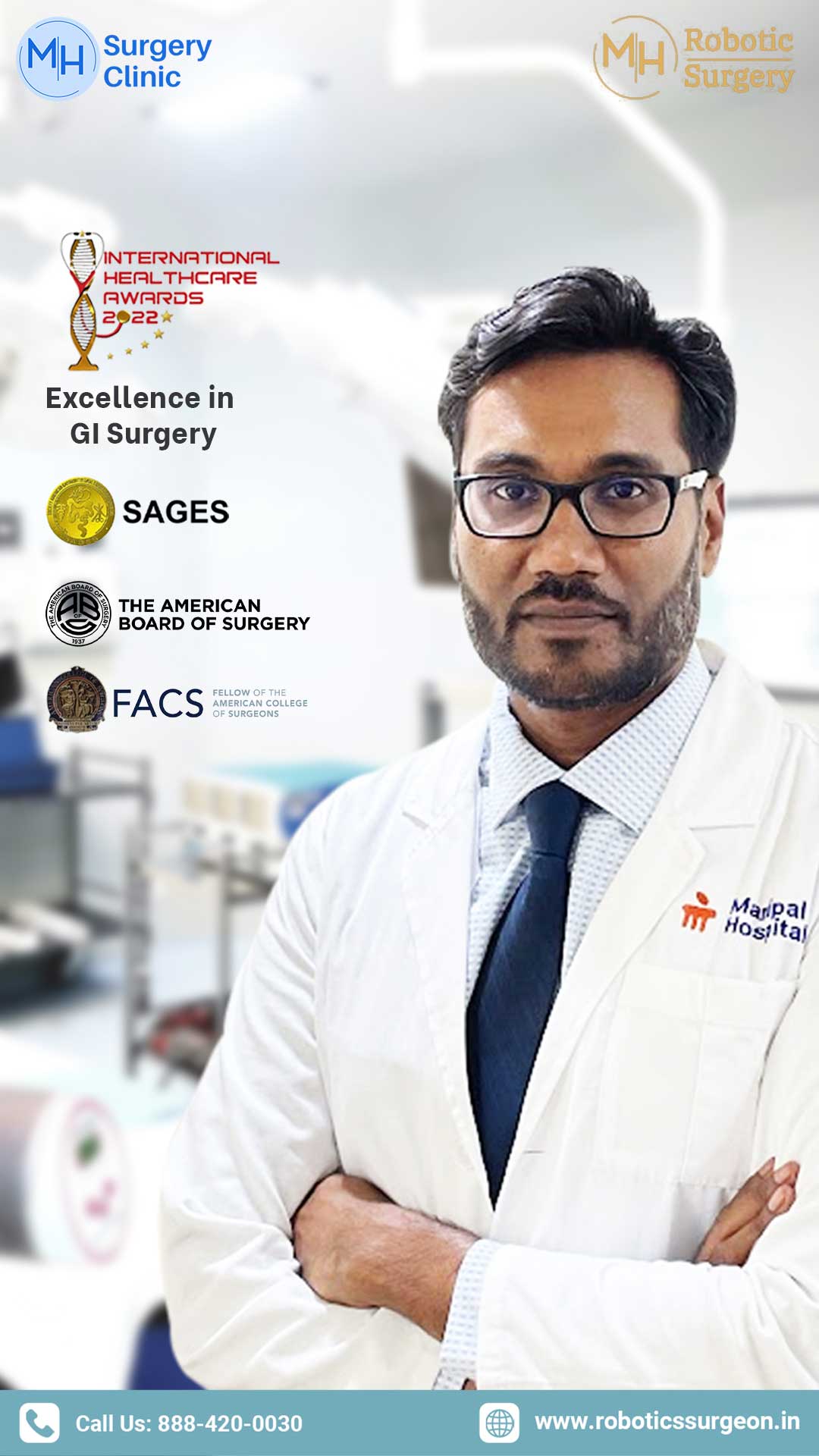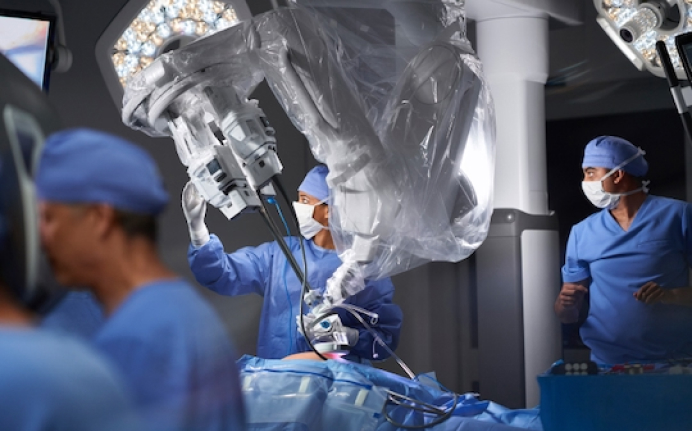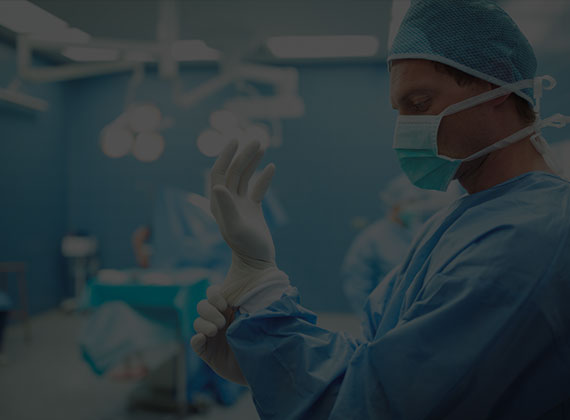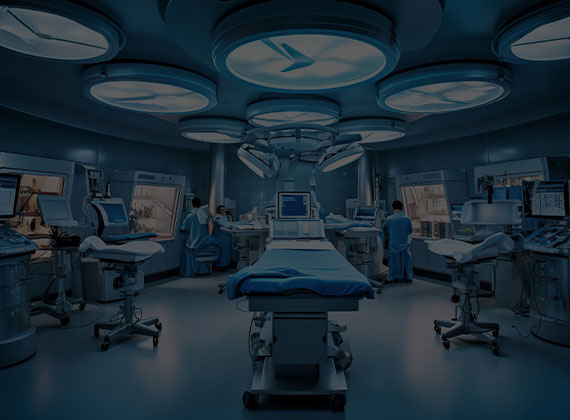
About Us
We believe robotic surgery is life-enhancing care
About Robotic Surgery
Robotic surgery, also known as robotic-assisted surgery, is a minimally invasive surgical technique that utilizes state-of-the-art robotic technology. It involves the use of a surgical robot, which is controlled by the surgeon, to perform precise and complex procedures with enhanced dexterity and precision.
Best Robotics Surgeon in Bangalore

Social Connect
Dr. Manjunath Haridas is the top Robotics Surgeon in Gastrointestinal Sciences and a well-known operator at MH Robotic Surgery Clinic in Bangalore. He has specialized in minimal invasion surgery that involves robot-assisted, gastrointestinal and hernia operations as well as other common surgeries. Moreover, he is a specialist in foregut advanced laparoscopic surgery and colon rectum procedures. His expertise also includes complex abdominal wall reconstruction surgery and surgical oncology, solidifying his position as one of the leading experts in robotic-assisted surgery today.
Being the top Robotics Surgeon in Bangalore, he embodies the combination of innovation and expertise by seamlessly integrating cutting-edge technology into his surgical skills. This fusion of technological advancement with excellence in surgery best defines him as an individual. Regarding contemporary techniques, for instance, robotics-assisted surgery, there is no equal to Dr. Manjunath Haridas, who has made great strides toward improving medical practices and patient care.
Qualification
- MBBS – Bangalore Medical College
- MD Surgery ( Cleveland, USA) Clinical Research Fellow Surgery (Cleveland USA)
- Robotic Surgery Fellowship (Atlanta, USA)
- Fellow of the International College of Surgeons (USA)
- Fellow of the American College of Surgeons (USA).
Field of Expertise
- Gastrointestinal Surgery – Colon and Rectum
- Advanced Robotic and Laparoscopic Surgery
- GI Oncology – Oesophagus, Stomach, Colon & Rectum
- Complex Abdominal Wall Reconstruction and Hernia Surgery
What to expect with robotic-assisted surgery
If you or someone you know is scheduled for robotic-assisted surgery, it’s natural to have questions about what to expect before, during, and after the procedure. Robotic surgery is a transformative medical technology that has revolutionized the field of surgery by enhancing the capabilities of surgeons and improving patient outcomes. Here’s an overview of what you can typically anticipate when undergoing robotic-assisted surgery:

Before the Surgery
Consultation: You will have one or more consultations with your surgeon to
discuss your medical condition, the surgical procedure, and whether
robotic-assisted surgery is the right option for you and any alternatives if there are any.
Preoperative Evaluation: Before the surgery, you may need to undergo several tests and evaluations to ensure you are a suitable candidate. This may include blood tests, imaging scans, and a review of your medical history.
Preparation: Your surgeon and healthcare team will provide specific instructions about how to prepare for the surgery. This may involve fasting for a certain period, discontinuing certain medications, and taking a shower with a special soap to reduce the risk of infection.
During the Surgery
Anesthesia: You will be given anesthesia to keep you pain-free and asleep during
the surgery. The type of anesthesia (general or local) will depend on the specific procedure and your medical condition.
Operating Room Setup: In the operating room, the surgical team will position you on the operating table and prepare the surgical area. The robotic system will be set up, and your surgeon will be seated at the console.
Robotic Assistance: Your surgeon will control the robotic arms and instruments from the console. The robotic system provides enhanced precision and dexterity during the surgery.
After the Surgery
Recovery Room: After the surgery, you will be taken to a recovery area where
you'll gradually wake up from anesthesia. A nurse will monitor your condition
closely.
Pain Management: You may experience some pain or discomfort after surgery. Your healthcare team will provide pain management medications as needed.
Hospital Stay: The length of your hospital stay will vary depending on the type of surgery and your individual recovery progress. Many robotic-assisted surgeries result in shorter hospital stays compared to traditional open surgery.
Why Choose Robotic Surgery

Enhanced Vision
The robotic system delivers 3D high-definition views, giving your surgeon a crystal clear view of the surgical area that is magnified 10 times to what the human eye sees. This helps the surgeon perform surgery with greater accuracy and smoothness.![?php echo $section_4['title_2']; ?>](https://roboticssurgeon.in/wp-content/uploads/2023/09/why-choose-2.jpg)
Precise Movements
Robotic systems provide high precision and delicate motor control, lowering the possibility of human error. Surgeons utilize tiny devices that mimic human hands. Built-in tremor-filtration technology helps in smooth and precise movements.
Minimal Blood Loss
Robotic surgery is minimally invasive, meaning it involves small incisions wiith minimal tissue damage resulting in less pain, and reduced scarring. Less blood means results in faster healing, less time in hospital and return to life sooner than expected.We are making robotic surgery a new standard of care
Robotic surgery is an ambitious and exciting endeavor. Creating a new standard of robotic care requires dedication, collaboration, and a commitment to improving healthcare outcomes for patients. We are committed to this. This significantly impacts patients and their outcomes. Some key steps and considerations for establishing this new standard are
Patient-Centered Care
Prioritize patient safety and well-being in the development and implementation of robotic care. Involve patients in the decision-making process, provide clear information, and address their concerns and preferences. Conduct rigorous clinical trials and studies.
Interdisciplinary
A multidisciplinary team of experts, including clinicians, roboticists, engineers, data scientists, and healthcare administrators, to collaborate on this initiative. Encourage open communication and collaboration which leads to better patient outcomes.
Cost-Effectiveness
Assess the cost-effectiveness of robotic care and explore ways to make it more accessible to a broader range of patients. Collaborate with healthcare payers and providers to ensure reimbursement for robotic procedures.



